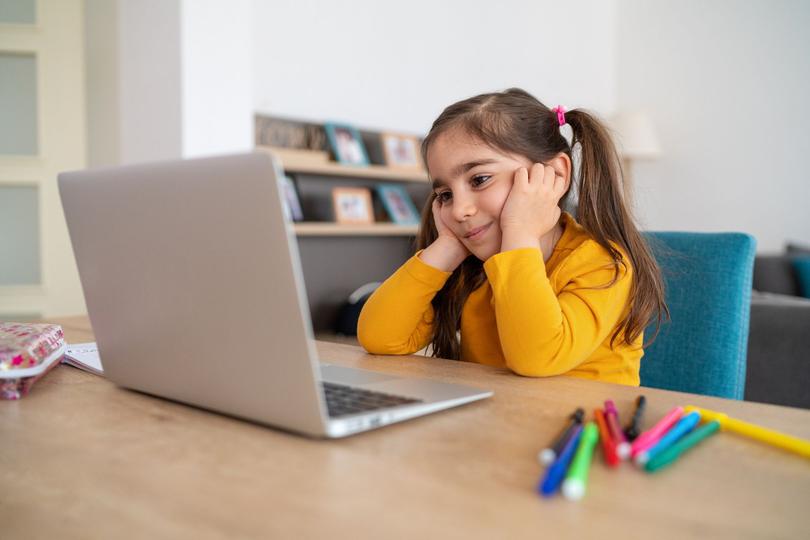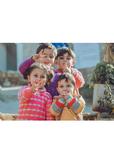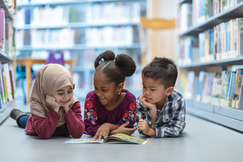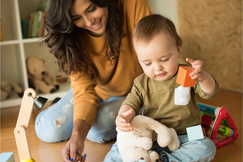"You did that wrong? Very good. What can you learn from it?"
An interview about "mindful" learning and learning gaps
"I can't do this," "I don't want to," "I'd rather dance on TikTok." With or without classroom instruction: When children and young people are lagging behind in the subject matter, their motivation to continue to attend school quickly diminishes. An upward spiral occurs when children are allowed to make mistakes and find personal meaning in learning.

What can I do to inspire my child to learn? How can I support my child when there are gaps in his or her learning? In the middle of the second lockdown, the parents' hotline spoke with Educational Influencer Laura Vogt about these and many more questions. The teacher has dedicated herself to the topic of education and has given us tips and tricks on how learning makes children strong
Will the schools remain open during the winter?
The pedagogue is optimistic: "Already in the first lockdown we all noticed that school is not only a place of learning but also a place of encounter. After the first lockdown, many people rightly saw educational justice in danger. In the second wave, schools will remain open as long as possible at the request of politicians".
Nevertheless, the incidence of infection is dynamic and schools must react accordingly. In some places whole classes are quarantined, even the entire school, because there are simply too many corona cases. "When it comes to distance learning for individual students or entire classes, the school is called upon to continue to accompany and stay close to the students". Educational researcher Klaus Hurrelmann also sees the educational staff as responsible for offering a substitute for face-to-face teaching. In an earlier interview, he suggested that parents look for additional "learning contacts" for their children.
The editorial staff of the Parents' Hotline has collected further tips from experts on how parents can be helpful during distance learning without slipping into the role of the teacher.
How can children close learning gaps?
Forgotten the multiplication tables? What are fables again? Learning gaps are caused by missed lessons or misunderstood topics that have not been worked through. In April we already reported on the parents' hotline about learning gaps in connection with the first lockdown. In the interview at the time, our expert suspected: "In a year's time, these weeks without lessons will no longer play a role". ("A year from now these weeks without class won't matter.").
Laura Vogt pleads for a differentiated approach to learning deficits, whatever the reason for them. It is less bad not to have read a certain story than to forget the basics. Especially if one of the following aspects applies or even both come together, she recommends that parents talk to the teacher:
- My child is in the sixth form
- The missing teaching material is fundamental for further contents
In this case, it is helpful if parents contact the teacher, ask for a list of important contents and possibly ask for extra material
Children benefit from the feeling of being "self-effective" and have a sense of achievement! This in turn is much easier when children understand what is at stake.
The editorial staff of the Parents' Hotline presents here exercise platforms on which children can deepen their knowledge of school material at home with ease.
How can parents inspire their child to learn?
Our expert: Laura Natascha Vogt studied teaching philosophy and special education. She has further training for the school subject "happiness", which was introduced as a teaching subject in some federal states. On Instagram she writes about the topics educational justice, school development and mindfulness. She also has a podcast on education entitled "School of Life".
Our expert:
Laura Natascha Vogt studied teaching philosophy and special education. She has a further education for the school subject "happiness", which was introduced as a teaching subject in some federal states. On Instagram she writes about the topics educational justice, school development and mindfulness. She also has a podcast on education entitled "School of Life"
In addition to thoughts about school content and possible gaps, maintaining a "real relationship" with the child plays a key role. By this, the educator means that parents acknowledge their child's feelings and needs and support his or her abilities. Learning also means being allowed to experience oneself.
"There's always something fun for kids and teens. Encouraging children to do exactly those things is the most important thing". Good grades alone do not help in the long term "if children see no sense in what they do".
"Recognizing one's talents can build a healthy self-confidence." Computer scientist or dancer? This is how children develop images of who they want to be.
Defects that don't hurt your confidence
To support the child in school and at the same time not to put pressure on him, a narrow degree. "Error-friendliness" is the magic word, according to Laura Natascha Vogt. "We should refrain from saying: 'You did this and that right and did this and did that wrong'. But: 'You did this wrong, very well, what can you learn from it?'" Then "mistakes" become experiences that don't scratch your self-confidence, but motivate you to try things again in a new and different way.
According to Laura Natascha Vogt, sustainable education is only possible through appreciation. "Children must feel that they are not just a little light in a dark tunnel. They must feel that their feelings and their actions make a difference. Then they realize: "Hey, I can make a difference in this world".
Did you like our article? The education expert Klaus Hurrelmann also says "Children want to be taken seriously! Our editorial staff has 3 tips for you on how children learn well. In our Parents' Hotline Library you will find a variety of contact points for families or parents in special situations.
Published on
Topics
Articles on the topic
-
How do I find a school place for my child?
Depending on the state and type of school, different things need to be...

-
Childcare - how does it work in Germany?
The path from application to daycare place is simple and complicated at...

-
You don't have to be a read-aloud king or queen, but..
Reading adventures with your child are not to be missed!

-
Corona - and then what?
How you can support your teenager with fear of the future

-
Good night, clichés!
"modern" books for children and young people

-
From infant to toddler
Short years full of milestones
